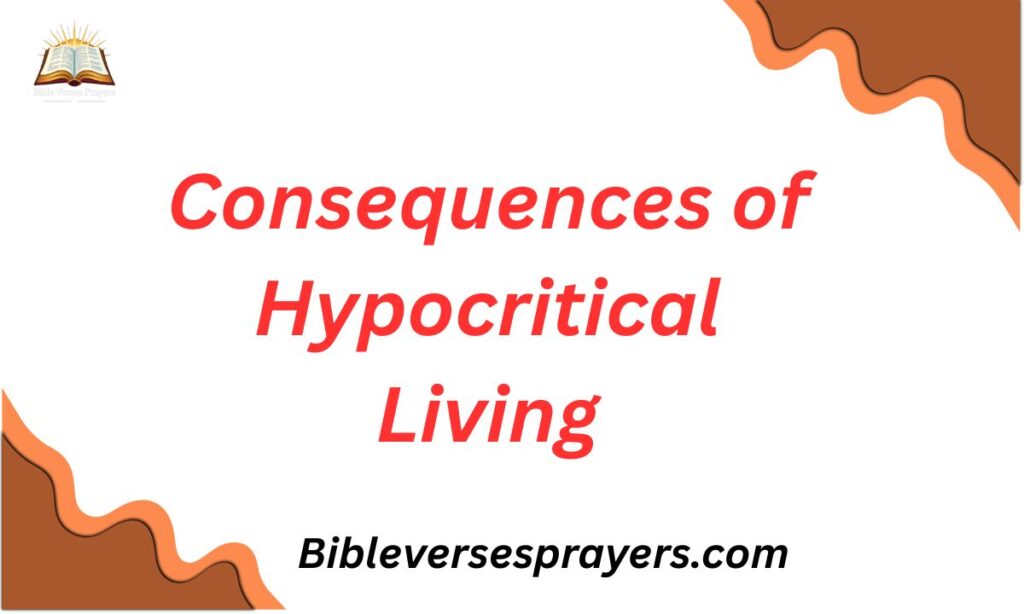Hypocrisy stands as one of the most consistently condemned behaviors throughout Scripture. From the Old Testament prophets to Jesus Christ’s direct teachings.
The Bible repeatedly warns against the dangers of living a double life—professing faith while acting contrary to those beliefs.
These verses serve as both warning and guidance, calling believers to authentic faith and genuine spiritual integrity.
Old Testament Warnings Against Hypocrisy
1. Isaiah 29:13 “The Lord says: ‘These people come near to me with their mouth and honor me with their lips, but their hearts are far from me. Their worship of me is based on merely human rules they have been taught.'”
This foundational verse reveals God’s rejection of superficial worship. True devotion requires heart-level commitment, not just outward religious performance.
2. Jeremiah 7:9-10 “Will you steal and murder, commit adultery and perjury, burn incense to Baal and follow other gods you have not known, and then come and stand before me in this house, which bears my Name, and say, ‘We are safe’?”
God condemns those who engage in sinful behavior while seeking refuge in religious spaces. Genuine faith cannot coexist with deliberate disobedience.
3. Ezekiel 33:31 “My people come to you, as they usually do, and sit before you to hear your words, but they do not put them into practice. Their mouths speak of love, but their hearts are greedy for unjust gain.”
Listening to God’s word without application reveals the emptiness of mere religious attendance. True faith demands practical obedience.
4. Amos 5:21-24 “I hate, I despise your religious festivals; your assemblies are a stench to me. Even though you bring me burnt offerings and grain offerings, I will not accept them… But let justice roll on like a river, righteousness like a never-failing stream!”
God prioritizes justice and righteousness over empty religious rituals. Authentic worship must be accompanied by ethical living.
Jesus’ Direct Condemnation of Hypocrites
5. Matthew 6:1-2 “Be careful not to practice your righteousness in front of others to be seen by them… So when you give to the needy, do not announce it with trumpets, as the hypocrites do in the synagogues and on the streets, to be honored by others.”
Jesus warns against performing good deeds for public recognition. True righteousness seeks God’s approval, not human praise.
6. Matthew 7:3-5 “Why do you look at the speck of sawdust in your brother’s eye and pay no attention to the plank in your own eye? You hypocrite, first take the plank out of your own eye, and then you will see clearly to remove the speck from your brother’s eye.”
Self-examination must precede criticism of others. Jesus demands humility and self-awareness before judging others.
7. Matthew 23:27-28 “Woe to you, teachers of the law and Pharisees, you hypocrites! You are like whitewashed tombs, which look beautiful on the outside but on the inside are full of the bones of the dead and everything unclean.”
This powerful metaphor exposes the danger of external religious appearance masking internal spiritual corruption.
8. Luke 12:1 “Be on your guard against the yeast of the Pharisees, which is hypocrisy.”
Jesus warns that hypocrisy spreads like yeast, contaminating entire communities. Believers must actively guard against its influence.
Hypocrisy in Speech and Actions

9. James 1:26 “Those who consider themselves religious and yet do not keep a tight rein on their tongues deceive themselves, and their religion is worthless.”
Uncontrolled speech reveals the true condition of one’s heart. Authentic faith manifests in careful, truthful communication.
10. James 2:14-17 “What good is it, my brothers and sisters, if someone claims to have faith but has no deeds? Can such faith save them?… In the same way, faith by itself, if it is not accompanied by action, is dead.”
Faith without corresponding actions is meaningless. True belief necessarily produces practical obedience and service.
11. 1 John 4:20 “Whoever claims to love God yet hates a brother or sister is a liar. For whoever does not love their brother and sister, whom they have seen, cannot love God, whom they have not seen.”
Love for God must be demonstrated through love for others. Hatred toward people contradicts claims of divine love.
12. 1 Peter 2:1 “Therefore, rid yourselves of all malice and all deceit, hypocrisy, envy, and slander of every kind.”
Peter commands believers to actively reject hypocritical behavior. Spiritual growth requires deliberate elimination of deceptive practices.
Hypocrisy in Religious Leadership
13. Matthew 23:13 “Woe to you, teachers of the law and Pharisees, you hypocrites! You shut the door of the kingdom of heaven in people’s faces. You yourselves do not enter, nor will you let those enter who are trying to.”
Religious leaders who live hypocritically not only harm themselves but also prevent others from experiencing genuine faith.
14. 2 Corinthians 11:13-15 “For such people are false apostles, deceitful workers, masquerading as apostles of Christ. And no wonder, for Satan himself masquerades as an angel of light.”
Paul warns that false teachers often appear righteous while promoting deception. Discernment is crucial in identifying authentic spiritual leadership.
15. 1 Timothy 4:2 “Such teachings come through hypocritical liars, whose consciences have been seared as with a hot iron.”
Persistent hypocrisy can deaden one’s conscience, making deception easier and more natural.
The Call to Authentic Faith
16. Romans 12:9 “Love must be sincere. Hate what is evil; cling to what is good.”
Genuine love requires sincerity and moral clarity. Authentic believers actively reject evil while embracing goodness.
17. 2 Corinthians 1:12 “Now this is our boast: Our conscience testifies that we have conducted ourselves in the world, and especially in our relations with you, with integrity and godly sincerity.”
Paul models transparent living, conducting himself with integrity and sincerity rather than pretense or manipulation.
18. Philippians 1:10 “So that you may be able to discern what is best and may be pure and blameless for the day of Christ.”
Spiritual maturity involves developing discernment and pursuing purity, avoiding the compromises that lead to hypocrisy.
19. Hebrews 10:22 “Let us draw near to God with a sincere heart and with the full assurance that faith brings, having our hearts sprinkled to cleanse us from a guilty conscience.”
Approaching God requires sincerity and genuine faith, not pretense or religious performance.
20. James 3:17 “But the wisdom that comes from heaven is first of all pure; then peace-loving, considerate, submissive, full of mercy and good fruit, impartial and sincere.”
True wisdom is characterized by sincerity and good fruit, contrasting sharply with hypocritical behavior.
Consequences of Hypocritical Living

21. Matthew 24:51 “He will cut him to pieces and assign him a place with the hypocrites, where there will be weeping and gnashing of teeth.”
Jesus warns of eternal consequences for persistent hypocritical behavior, emphasizing the seriousness of authentic faith.
22. Job 8:13 “Such is the destiny of all who forget God; so perishes the hope of the godless.”
Hypocrisy leads to hopelessness and spiritual destruction, as it represents a fundamental departure from God.
23. Galatians 6:7 “Do not be deceived: God cannot be mocked. A man reaps what he sows.”
The principle of divine justice ensures that hypocritical behavior ultimately brings appropriate consequences.
Examples of Hypocritical Behavior to Avoid
24. Matthew 6:5 “And when you pray, do not be like the hypocrites, for they love to pray standing in the synagogues and on the street corners to be seen by others.”
Prayer should be directed toward God, not performed for human audience or approval.
25. Matthew 6:16 “When you fast, do not look somber as the hypocrites do, for they disfigure their faces to show others they are fasting.”
Spiritual disciplines should be practiced sincerely, not as displays of religiosity.
26. Luke 20:46-47 “Beware of the teachers of the law. They like to walk around in flowing robes and love to be greeted with respect in the marketplaces… They devour widows’ houses and for a show make lengthy prayers.”
Jesus condemns religious leaders who seek honor while exploiting the vulnerable, revealing the destructive nature of hypocritical leadership.
The Path to Authenticity
27. Micah 6:8 “He has shown you, O mortal, what is good. And what does the Lord require of you? To act justly and to love mercy and to walk humbly with your God.”
True spirituality is characterized by justice, mercy, and humility—qualities that eliminate hypocrisy.
28. Hosea 6:6 “For I desire mercy, not sacrifice, and acknowledgment of God rather than burnt offerings.”
God values genuine relationship and compassionate action over religious ritual and performance.
29. 1 Peter 1:22 “Now that you have purified yourselves by obeying the truth so that you have sincere love for each other, love one another deeply, from the heart.”
Authentic spiritual life produces sincere love that flows from obedience to truth.
30. Colossians 3:9 “Do not lie to each other, since you have taken off your old self with its practices.”
New life in Christ requires honesty and transparency, rejecting the deceptive practices of the former life.
Conclusion
The Bible’s consistent message about hypocrisy is clear: God desires authentic faith that integrates belief with action, private devotion with public behavior, and religious practice with ethical living. Hypocritical behavior not only damages one’s relationship with God but also harms others and undermines the credibility of faith communities.
These verses call believers to examine their hearts, align their actions with their professed beliefs, and pursue genuine spiritual transformation. True faith cannot coexist with deliberate deception or double-minded living. Instead, Scripture calls for integrity, sincerity, and authentic relationship with God that manifests in righteous living and genuine love for others.
The path forward requires honest self-examination, humble acknowledgment of failures, and commitment to authentic spiritual growth. By embracing these biblical principles, believers can avoid the trap of hypocrisy and experience the freedom and joy of genuine faith.
Frequently Asked Questions
What is the biblical definition of a hypocrite?
In biblical terms, a hypocrite is someone who professes faith or righteousness while living contrary to those beliefs. The word comes from the Greek term for “actor,” suggesting someone playing a false role.
Why did Jesus condemn hypocrites so strongly?
Jesus condemned hypocrisy because it represents false spirituality that misleads others and prevents genuine relationship with God. Hypocrites often became stumbling blocks for sincere seekers.
Can a person struggling with sin be considered a hypocrite?
Struggling with sin while genuinely seeking to overcome it differs from hypocrisy. Hypocrisy involves deliberate deception and lack of genuine repentance, while spiritual struggle often accompanies authentic faith.
How can I avoid becoming a hypocrite?
Regular self-examination, honest acknowledgment of failures, genuine repentance, and commitment to aligning actions with beliefs help prevent hypocritical behavior. Seek accountability from trusted spiritual mentors.
What should I do if I recognize hypocritical patterns in my life?
Acknowledge the hypocrisy honestly, seek forgiveness from God and those affected, make necessary changes, and establish accountability systems to maintain authentic faith going forward.






